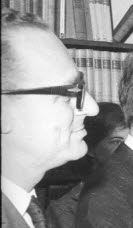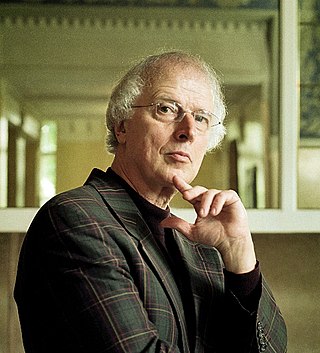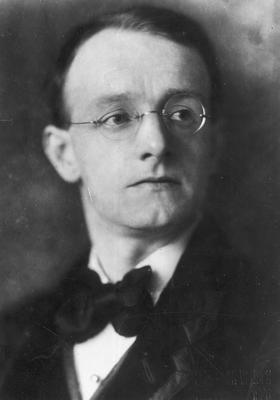Related Research Articles
Peter Ruzicka is a German composer and conductor of classical music. He was director of the Hamburg State Opera, the Philharmonic Orchestra of Hamburg and the Salzburg Festival. Ruzicka was managing director and Intendant of the Salzburg Easter Festival and is professor at the Hochschule für Musik und Theater Hamburg. The list of his compositions includes numerous orchestral and chamber music works as well as the opera "Celan", about the poet Paul Celan, which was premiered in Dresden in 2001. His opera "Hölderlin" had its premiere at the Berlin State Opera in 2008. Ruzicka's third opera "Benjamin", about the philosopher Walter Benjamin, was written in 2015/16 for the Hamburg State Opera and premiered in 2018.

Michael Andreas Gielen was an Austrian conductor and composer known for promoting contemporary music in opera and concert. Principally active in Europe, his performances are characterized by precision and vivacity, aiding his ability to interpret the complex contemporary music he specialized in.

Udo Zimmermann was a German composer, musicologist, opera director, and conductor. He worked as a professor of composition, founded a centre for contemporary music in Dresden, and was director of the Leipzig Opera and the Deutsche Oper Berlin. He directed a contemporary music series for the Bayerischer Rundfunk and a European centre of the arts in Hellerau. His operas, especially Weiße Rose, on a topic he set to music twice, have been performed internationally, and recorded.
Johannes Wolfgang Zender was a German conductor and composer. He was the chief conductor of several opera houses, and his compositions, many of them vocal music, have been performed at international festivals.

Toshio Hosokawa is a Japanese composer of contemporary classical music. He studied in Germany but returned to Japan, finding a personal style inspired by classical Japanese music and culture. He has composed operas, the oratorio Voiceless Voice in Hiroshima, and instrumental music.

Klang —Die 24 Stunden des Tages is a cycle of compositions by Karlheinz Stockhausen, on which he worked from 2004 until his death in 2007. It was intended to consist of 24 chamber-music compositions, each representing one hour of the day, with a different colour systematically assigned to every hour. The cycle was unfinished when the composer died, so that the last three "hours" are lacking. The 21 completed pieces include solos, duos, trios, a septet, and Stockhausen's last entirely electronic composition, Cosmic Pulses. The fourth composition is a theatre piece for a solo percussionist, and there are also two auxiliary compositions which are not part of the main cycle. The completed works bear the work (opus) numbers 81–101.

Franz Adolf Friedrich Schober, since 1801 von Schober, was a poet, librettist, lithographer, actor in Breslau and Legationsrat in Weimar.
Wolfgang Schöne is a German bass-baritone who made an international career in opera and concert, based at the Staatsoper Stuttgart from 1973 to 2005. He created roles in world premiered of operas, in Josef Tal's Die Versuchung at the Bavarian State Opera in 1976, in Hermann Reutter's Hamlet in Stuttgart in 1980, in Henze's Die englische Katze at the Schwetzingen Festival in 1983 and K. in Aribert Reimann's Das Schloß at the Deutsche Oper Berlin in 1992.
The Dresdner Kammerchor is a mixed chamber choir which was founded in 1985 by Hans-Christoph Rademann in Dresden and is still conducted by him. The semiprofessional ensemble of about 40 singers has appeared internationally.
Lin Wang, is a Chinese composer. Lin Wang was born in Dalian, China, in 1976.

Fidelio Friedrich "Fritz" Finke was a Bohemian-German composer.

Gerd Uecker was a German music teacher and a music and opera manager. From 1993 to 2000 he was artistic director of the Bavarian State Opera in Munich, and from 2003 to 2010 he directed in the same position the Semperoper in Dresden.
Georg von Dadelsen was a German musicologist, who taught at the University of Hamburg and the University of Tübingen. He focused on Johann Sebastian Bach, his family and his environment, and the chronology of his works. As director of the Johann Sebastian Bach Institute in Göttingen, he influenced the Neue Bach-Ausgabe (NBA), the second complete edition of Bach's works.
Jörn Peter Hiekel is a German musicologist.
Hans Schnoor was a German musicologist, journalist and music critic. In the late 1950s, he attracted media attention with his denunciation of Arnold Schönberg's A Survivor from Warsaw.
Karl-Rudi Griesbach was a German composer, librettist, dramaturge, music critic and academic teacher.
Hans Jürgen Wenzel was a German conductor and composer. He was chairman of the Verband der Komponisten und Musikwissenschaftler der DDR and professor for musical composition at the Hochschule für Musik Carl Maria von Weber Dresden.

Paul Scheinpflug was a German conductor and composer.
Stephan Matthias Lademann is a German pianist and academic teacher.
The Sinfonietta Dresden is a chamber orchestra from Dresden founded in 1994.
References
- ↑ Frankfurter Allgemeine Zeitung ; 3 August 2010, page 37.
- ↑ Goethe Institut China
- ↑ Karsten Gundermann on Datenbank Neue Musik
- ↑ Verrückt nach Paris on IMDb
- ↑ Echt clever! Geniale Erfindungen aus Hamburg on WorldCat
- ↑ Secret Sounds Musik und Klang aus China on WorldCat